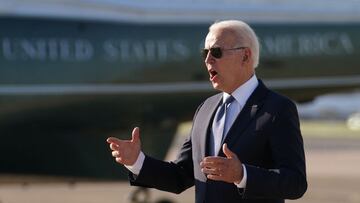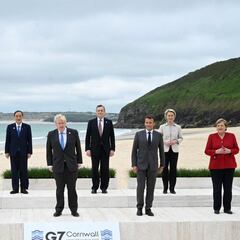What did Biden say at the G7 summit?
Leaders welcomed President Biden to the G-7 with open arms, with UK Prime Minster going so far as to say his presence was a breath of fresh air


The 2021 G-7 Summit, hosted by the United Kingdom, wrapped on 13 June after a series of intense discussions over taxation on multinational corporations, climate change, and the covid-19 pandemic.
According to the White House, the President is happy with the decisions made by the leaders and believes that they align well with his domestic agenda. To show the US’ commitment to its allies, including the six other nations that form part of the G-7, President Biden dinged his predecessor by saying that “the lack of participation in the past and in full engagement was noticed significantly not only by the leaders of those countries but by the people in the G-7 countries.” At a news conference on 13 June, President Biden described the summit as “extraordinary” and “collaborative.”
President Biden provides a vaccine distribution update: "We've agreed to work together so that the world is better prepared to detect and deal with future pandemics, because there will be future pandemics."
— CSPAN (@cspan) June 13, 2021
Full #G7Summit news conference video here: https://t.co/1JVNRAkp7K pic.twitter.com/UHG9mcOHir
Global distribution of covid-19 vaccines
The 2021 G-7 Communique, which details the decisions made, stated that the leaders understand that “the COVID-19 pandemic is not under control anywhere until it is under control everywhere.” The group aims to see at least sixty percent of the global population vaccinated by the end of 2022, which international public health experts believe is the threshold needed to bring the pandemic to an end.
Together, the G-7 countries pledged to donate one billion covid-19 vaccines to low-income countries by the end of next year. The US will provide the largest donation -- 500 million doses -- to COVAX, with the President detailing a timeline for distribution that includes the sending of “200 million of those doses by the end of the year, another 300 million by the first half of next year.” COVAX, the international vaccine distribution program, is aiming to begin its global effort in August.
The Heads of State also spent time discussing how they could collaborate to better prepare for the next pandemic, which many scientists see as inevitable. However, with greater preparation, a more agile and well-funded World Health Organization, and a commitment to global cooperation, the next pandemic would not have the same fatal consequences that the covid-19 health crisis has caused.
To help prepare and prevent future outbreaks, the leaders agreed to,
- Invest in “cutting edge research and innovation, seeking to ensure that global vaccines remain effective against variants of concern.”
- Build a more robust global surveillance system that would focus on genomic sequencing, which the group described as critical in enabling rapid detection of new covid-19 variants and novel viruses more generally.
- Support the implementation of the measures approved under the 2020 Rome Declaration, “Strengthening WHO preparedness for and response to health emergencies,” and more.
Taxation on Multinational Corporations
One of the most significant outcomes of the summit was the decision by the members to ensure that the corporate tax rate in their nations is at least fifteen percent. The decision made by financial leaders from each of the countries also declares that corporations will pay taxes in the places where they operate, regardless of if they have a headquarters there.
WATCH: In a landmark deal, the G7 agreed to back a minimum global corporate tax rate of at least 15%. Companies also will have to pay more taxes in the countries where they make sales https://t.co/HgbT4T84Eh pic.twitter.com/LYPrF3d9FH
— Reuters (@Reuters) June 14, 2021
Related stories
President Biden was pleased with this decision explaining that the international tax system has allowed systems to get away with not paying their fair share by engaging with “what are essentially tax havens.” The President continued saying that the move to create a tax floor for corporations operating across countries will “to help arrest the race to the bottom that’s been going on among nations attracting corporate investment at the expense of priorities like protecting our workers and investing in infrastructure.”
The leaders see this as a first step in implementing this sort of change at the global level. At the next meeting of the G-20, the discussion will be continued to create more buy-in with the end goal of creating “a global agreement on an equitable solution on the allocation of taxing rights and an ambitious global minimum tax of at least 15 percent on a country-by-country basis.” The G-20 countries are scheduled to meet in July.
- Joseph Biden
- COVAX
- G-7
- Corporate tax
- Covid-19 economic crisis
- Science
- Coronavirus Covid-19
- Economic crisis
- United States
- Taxes
- Pandemic
- Coronavirus
- Vaccines
- North America
- Tributes
- Virology
- Outbreak
- Infectious diseases
- Vaccination
- Economic climate
- Public finances
- Preventive medicine
- Diseases
- Microbiology
- International organisations
- America
- Medicine
- Política autonómica
- Foreign relations
- Spain
- Finances
- Biology
- Health
- Politics
- Life sciences

